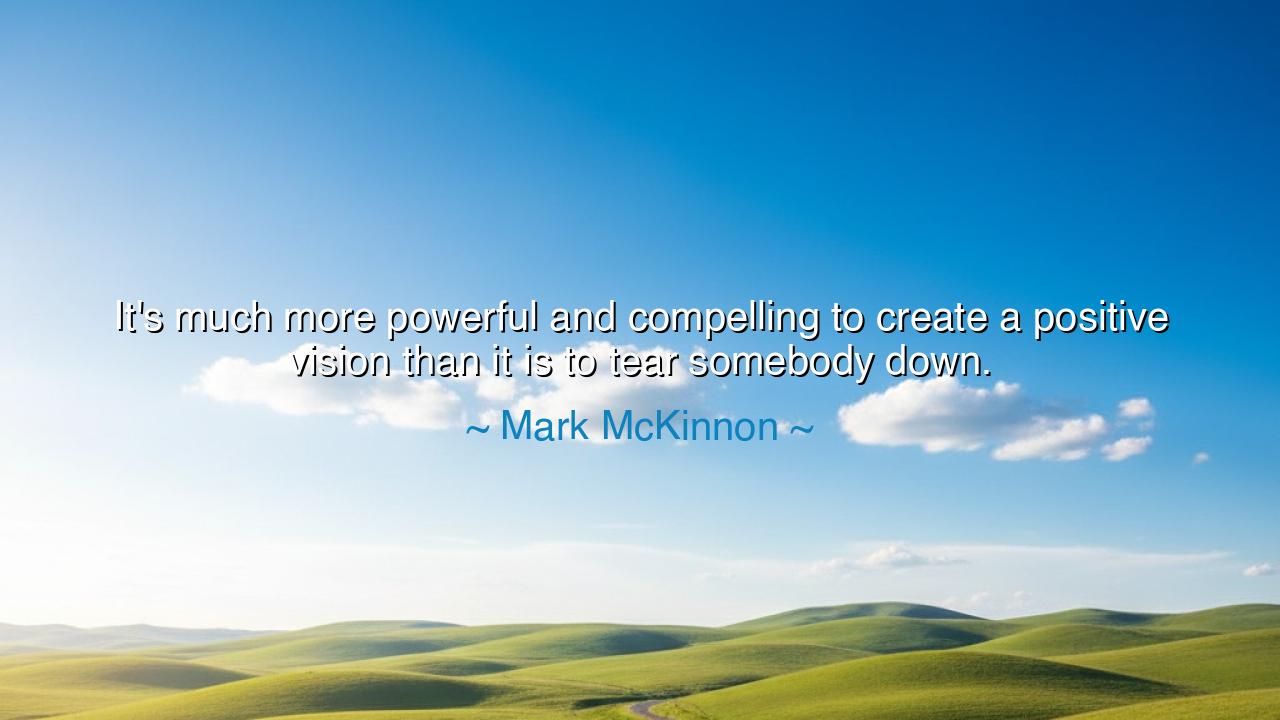
It's much more powerful and compelling to create a positive
It's much more powerful and compelling to create a positive vision than it is to tear somebody down.






The words of Mark McKinnon—“It’s much more powerful and compelling to create a positive vision than it is to tear somebody down”—resound like a guiding light through the storms of human rivalry. He reminds us that true greatness is not found in destruction, but in creation. To build is harder than to break, yet it carries the strength to endure. Words that wound may cut deeply for a moment, but visions that uplift have the power to live for generations. McKinnon speaks of a truth as old as civilization itself: that a positive vision is a force far greater than any campaign of scorn or slander.
The origin of this wisdom lies in the struggles of leadership and persuasion throughout history. From politics to philosophy, from prophets to rulers, humanity has always faced a choice: win by sowing division, or inspire by revealing a higher path. Those who sought victory by tearing others down may have triumphed for a season, but their legacy faded like smoke in the wind. Those who cast a vision that uplifted the human spirit built empires of the heart that time could not erase.
Consider the life of Martin Luther King Jr. In a time of hatred and division, he did not base his dream on tearing his enemies down. He could have filled his speeches with fury alone, but instead he gave his people a positive vision: a dream where children of all races could walk together, where justice would flow like water, where love would triumph over hate. That vision was powerful, not because it denied injustice, but because it offered hope beyond it. His enemies tried to silence him, yet his dream still burns in the hearts of millions long after their voices faded.
Contrast this with the tale of leaders who built their power on tearing others down. The dictators of the twentieth century rose through fear, mockery, and the dehumanization of entire peoples. Their words poisoned societies and unleashed rivers of blood. Yet their power, though terrible, was fleeting. Their names are remembered with shame, their empires reduced to rubble. Their legacy proves McKinnon’s wisdom: destruction may win wars, but only positive vision builds peace.
The meaning of McKinnon’s words is not limited to leaders and rulers—it touches the heart of every human life. In families, in friendships, in communities, one may choose to tear others down with bitterness, or to cast a vision of encouragement and possibility. The first path breeds resentment; the second nurtures growth. To inspire is always harder than to insult, but it is also always more powerful, for it awakens the best within others.
The lesson for us is radiant: measure your words not by the sharpness of their sting, but by the greatness of the future they inspire. When tempted to belittle, remember that you hold within you the power to build. When faced with conflict, ask: What vision of goodness can I offer, that is greater than this quarrel? For those who shape with hope are remembered as builders of light, while those who destroy are forgotten in shadow.
Practical wisdom calls us to act. Speak to others in ways that call forth their strength, not their shame. In your work, your art, your leadership, and your daily life, strive to plant seeds of positive vision that will bear fruit long after you are gone. When you must oppose evil, do so with clarity, but never forget to offer the world an image of what goodness looks like. For only then will hearts be moved, not by fear, but by faith in what might yet be.
Thus, let McKinnon’s words endure as a beacon: the greatest power is not in tearing others down, but in lifting humanity up. A positive vision is a fire that no storm can quench, a legacy that no enemy can erase. Build such a vision, and you will find that it is more compelling than any weapon of mockery, and more enduring than any wall of hate. For it is creation, not destruction, that writes the story of human progress.






3Q32. Quan
This quote resonates deeply, as it speaks to the power of constructive and visionary thinking. It’s much more fulfilling to build something positive rather than engage in negative behavior. But I question: In a world so driven by competition and comparison, how do we constantly remind ourselves to take the high road and create something meaningful instead of falling into the trap of tearing others down? What strategies can help sustain this approach?
VPBao Vy Pham
McKinnon’s quote reminds me that constructive criticism and vision-building are far more effective than destructive behavior. It’s easy to get caught up in negativity, but I wonder: What are some practical ways to shift our mindset towards creating positive visions, especially in environments that may be rife with criticism? How do we encourage others to focus on growth and possibilities instead of tearing down what’s been built?
NXVu Nguyen Xuan
I agree with McKinnon’s perspective that building a positive vision is far more impactful than tearing people down. It’s a reminder that we have the choice to uplift others and ourselves, even in tough situations. However, how do we maintain this mindset when we’re faced with constant criticism or negativity from others? Can we stay focused on positive goals without getting discouraged by the surrounding negativity?
VANguyen Van A
Mark McKinnon’s quote really highlights the power of positivity. It’s true that creating a vision for the future can inspire and motivate people, while tearing others down only fosters negativity. But I wonder: why is it often easier to focus on criticism rather than building something positive? Is it because negativity grabs attention more easily, or do we simply find it harder to create meaningful change without a clear direction?